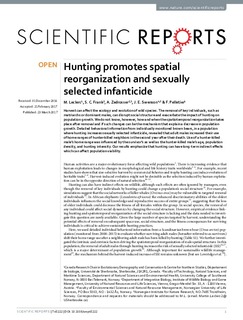Hunting promotes spatial reorganization and sexually selected infanticide
Journal article, Peer reviewed
Published version
Permanent lenke
http://hdl.handle.net/11250/2500258Utgivelsesdato
2017Metadata
Vis full innførselSamlinger
Sammendrag
Harvest can affect the ecology and evolution of wild species. The removal of key individuals, such as matriarchs or dominant males, can disrupt social structure and exacerbate the impact of hunting on population growth. We do not know, however, how and when the spatiotemporal reorganization takes place after removal and if such changes can be the mechanism that explain a decrease in population growth. Detailed behavioral information from individually monitored brown bears, in a population where hunting increases sexually selected infanticide, revealed that adult males increased their use of home ranges of hunter-killed neighbors in the second year after their death. Use of a hunter-killed male’s home range was influenced by the survivor’s as well as the hunter-killed male’s age, population density, and hunting intensity. Our results emphasize that hunting can have long-term indirect effects which can affect population viability

